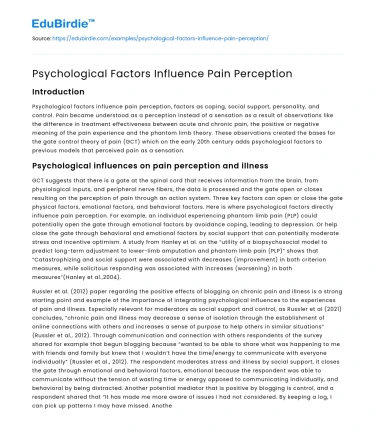Introduction
Psychological factors influence pain perception, factors as coping, social support, personality, and control. Pain became understood as a perception instead of a sensation as a result of observations like the difference in treatment effectiveness between acute and chronic pain, the positive or negative meaning of the pain experience and the phantom limb theory. These observations created the bases for the gate control theory of pain (GCT) which on the early 20th century adds psychological factors to previous models that perceived pain as a sensation.
Psychological influences on pain perception and illness
GCT suggests that there is a gate at the spinal cord that receives information from the brain, from physiological inputs, and peripheral nerve fibers, the data is processed and the gate open or closes resulting on the perception of pain through an action system. Three key factors can open or close the gate physical factors, emotional factors, and behavioral factors. Here is where psychological factors directly influence pain perception. For example, an individual experiencing phantom limb pain (PLP) could potentially open the gate through emotional factors by avoidance coping, leading to depression. Or help close the gate through behavioral and emotional factors by social support that can potentially moderate stress and incentive optimism. A study from Hanley et al. on the “utility of a biopsychosocial model to predict long-term adjustment to lower-limb amputation and phantom limb pain (PLP)” shows that “Catastrophizing and social support were associated with decreases (improvement) in both criterion measures, while solicitous responding was associated with increases (worsening) in both measures”(Hanley et al.,2004).
Save your time!
We can take care of your essay
- Proper editing and formatting
- Free revision, title page, and bibliography
- Flexible prices and money-back guarantee
Russler et al. (2012) paper regarding the positive effects of blogging on chronic pain and illness is a strong starting point and example of the importance of integrating psychological influences to the experiences of pain and illness. Especially relevant for moderators as social support and control, as Russler et al (2021) concludes, “chronic pain and illness may decrease a sense of isolation through the establishment of online connections with others and increases a sense of purpose to help others in similar situations” (Russler et al., 2012). Through communication and connection with others respondents of the survey shared for example that begun blogging because “wanted to be able to share what was happening to me with friends and family but knew that I wouldn’t have the time/energy to communicate with everyone individually” (Russler et al., 2012). The respondent moderates stress and illness by social support, it closes the gate through emotional and behavioral factors, emotional because the respondent was able to communicate without the tension of wasting time or energy opposed to communicating individually, and behavioral by being distracted. Another potential mediator that is positive by blogging is control, and a respondent shared that “It has made me more aware of issues I had not considered. By keeping a log, I can pick up patterns I may have missed. Another respondent shared that it find it easier to identify triggers and patterns” (Russler et al., 2012), this attribution of control is another mediator of the stress/illness and can help close the gates. Unfortunately, the paper has limitations as the demographic data “is not fully representative of the overall online population with chronic disease” (Russler et al., 2012).
Conclusion
Psychological influences are important factors in both stress/illness and pain perception, theories like GCT and psychological moderators, can be applied in many formats, personally I would have never had put much thought into blogging, but it’s clear that today, many of this influences can be translated to an online setting, which is exciting for the future of health strategies.
References
- Hanley, M. A., Jensen, M. P., Ehde, D. M., Hoffman, A. J., Patterson, D. R., & Robinson, L. R. (2004). Psychosocial predictors of long-term adjustment to lower-limb amputation and phantom limb pain. Retrieved from https://www.ncbi.nlm.nih.gov/pubmed/15497917
- Ogden, J. (2017). The psychology of health and illness: An open-access course. The psychology of health and illness.pdf
- Ressler, P. K., Bradshaw, Y. S., Gualtieri, L., & Chui, K. K. H. (2012). Communicating the experience of chronic pain and illness through blogging. Journal of Medical Internet Research, 14(5), e143. Retrieved from https://www.ncbi.nlm.nih.gov/pmc/articles/PMC3510726/






 Stuck on your essay?
Stuck on your essay?

